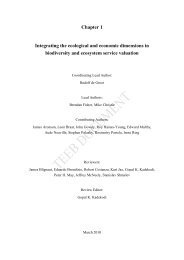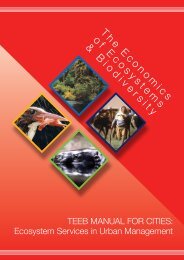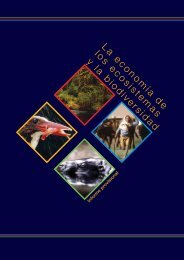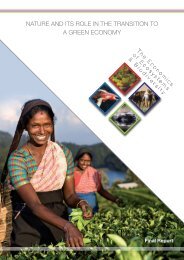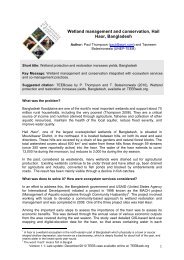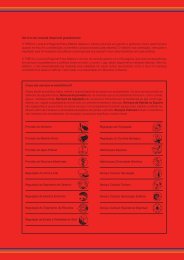Download (PDF, 6.71MB) - TEEB
Download (PDF, 6.71MB) - TEEB
Download (PDF, 6.71MB) - TEEB
Create successful ePaper yourself
Turn your PDF publications into a flip-book with our unique Google optimized e-Paper software.
Rewarding the provision of services<br />
In order to stimulate ecosystem service provision, it is<br />
critical to reward those involved in managing and securing<br />
these services. Over the years, a number of options<br />
have been developed to provide financial and technical<br />
support to communities and individuals committed to<br />
sound stewardship of natural resources. Policy options<br />
range from supporting community-based management<br />
over well equipped agricultural extension services to tax<br />
breaks and easements.<br />
If suitably designed and implemented, payments for<br />
ecosystem service (PES) are ready to deliver benefits<br />
and can address distributional aspects (see section 10.4<br />
and Chapter 5). Evaluation of their performance to date<br />
has identified ways to make them even more effective<br />
and cost-efficient. PES are adaptable and can be flexibly<br />
linked to e.g. protected area networks or environmental<br />
challenges like water management. There already exists<br />
a wide range of experience that can be relatively easily<br />
replicated and adapted for use in other countries.<br />
REDD presents the opportunity to establish the very<br />
first global system of payments for ecosystem services.<br />
The adoption of a REDD-Plus agreement in the ongoing<br />
climate change negotiations and its implementation is a<br />
unique win-win solution that could offer cost-effective<br />
climate change mitigation with significant environmental<br />
co-benefits.<br />
Supporting natural capital investments<br />
Well-targeted investment in natural capital can provide<br />
high rates of return and deliver co-benefits (see section<br />
10.3 and Chapters 8 and 9). All countries – to a varying<br />
degree – will have to respond to climate change impacts<br />
by strengthening their adaptive capacities. Investing to<br />
strengthen the resilience of ecosystems is an obvious<br />
path to take. Protected areas and ecological infrastructure<br />
already provide us with the basic building<br />
blocks for this purpose. Combining protective management<br />
policies with restoration of degraded areas<br />
can help us safeguard the ingredients for economic<br />
prosperity and sustained livelihoods.<br />
RESPONDING TO THE VALUE OF NATURE<br />
10.5.3 THE ROAD AHEAD<br />
As discussed in section 10.4, transition will be a difficult<br />
task and a gradual approach will be helpful – firstly, to<br />
provide the time necessary for this ‘learning by doing<br />
process’ and secondly, because policy action will lead<br />
to costs for those who benefit from the current situation<br />
and who can be expected to argue against change.<br />
Here, it can help to communicate the links between natural<br />
capital and economic activity, social well-being and<br />
prosperity in ways adapted to target audiences.<br />
Changing operational mentalities, recognising the value<br />
of biodiversity and moving away from short-term<br />
decision-making are all part of the road ahead. Many<br />
options will depend on collaborating across levels and<br />
on creating partnerships.<br />
Creating policy change at all levels<br />
While many of the opportunities identified above allow<br />
policy makers to act at the national level, others will<br />
require countries to collaborate much more closely on<br />
implementation. Over the past decades, several international<br />
conventions and institutions have been set up<br />
with the Convention on Biological Diversity (CBD) the<br />
most prominent one in this area.<br />
Our experience with the IPCC shows us, encouragingly,<br />
that cooperative international efforts can leverage<br />
real change in political priorities and social attitudes.<br />
Action on climate change has opened the way for a<br />
broader portfolio of actions to protect our natural<br />
capital stock. The new Intergovernmental Science-<br />
Policy Platform for Biodiversity and Ecosystem Services<br />
(IPBES) aims to provide a launching pad for this purpose.<br />
Global initiatives with importance for ecosystem services<br />
and biodiversity also come from other policy arenas.<br />
As discussed in section 10.3 and Chapter 5,<br />
a possible REDD-Plus agreement and any corresponding<br />
instrument at the climate negotiations in<br />
Copenhagen will constitute an important step forward.<br />
These will obviously require corresponding infrastructure,<br />
governance and political commitment to implementation<br />
at both national and international levels.<br />
<strong>TEEB</strong> FOR NATIONAL AND INTERNATIONAL POLICY MAKERS - CHAPTER 10: PAGE 29



